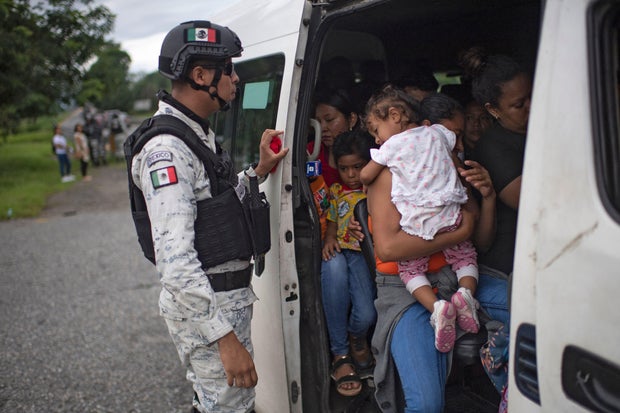Latin American nations agree to help U.S. curb unlawful migration
President Biden is set to unveil a migration accord at the Summit of the Americas in Los Angeles Friday that the White House hopes will help the U.S. reduce the historic levels of migrants arriving at the southern border over the past year, a senior administration official says.
Under the declaration by the U.S. and other Western Hemisphere nations, several of the governments commit to taking in more asylum-seekers, among other steps.
The agreement centers on stabilizing communities in Latin America, expanding lawful means of immigration, bolstering “humane” border enforcement across the region and collaborating on responses to the displacement of people, the official told reporters, requesting anonymity in order to discuss the agreement before its formal announcement.
By joining the pact, the U.S. and other nations will commit to increasing temporary work visas to discourage unlawful immigration and mitigate labor shortages in the U.S., Canada and Mexico; expanding refugee resettlement and family reunification programs; increasing support for countries hosting large numbers of migrants; and collaborating on efforts to dismantle human smuggling networks.
The Biden administration will expect signatories to expand screenings of migrants in their territory so countries south of the U.S. can more quickly grant asylum to those who qualify for humanitarian protection and deport those who don’t, the senior administration official said.
The U.S. government, the official added, will also commit to providing additional humanitarian aid to Haiti to discourage unauthorized migration from the Caribbean nation, which over the past year has seen a record number of its citizens flee to the U.S. by land and sea.
“The Western Hemisphere as a region is undergoing historic and unprecedented rates of irregular migration,” the senior administration official said. “Nearly every country has been impacted.”
The U.S. Department of Homeland Security (DHS) on Friday announced it launched a $50-million effort this spring to curb migrant smuggling, dispatching 1,300 officers to the southern border and Latin America, who have so far carried out 30,000 law enforcement actions against smugglers, including 2,000 arrests in the past eight weeks.
DHS also said it will resume later this year two programs that allow Cubans and Haitians with family members in the U.S. who have sponsored them for an immigrant visa to come to the country legally more quickly.
The official said the U.S. does not expect all countries in Western Hemisphere to sign the declaration, noting the Biden administration prioritized nations “most affected” by migration. The official did not provide a specific number of countries expected to sign the agreement.
PEDRO PARDO/AFP via Getty Images
Asked how the U.S. will ensure that all countries follow through on the commitments they make in the accord, the official said the administration will maintain an “open dialogue” on its implementation but “will certainly expect that all countries do their part.”
“Actions are the most important thing,” the official said, adding later, “This is at its heart, at its core, about responsibility sharing.”
The Biden administration hopes the migration accord will be one of the landmark achievements of the Los Angeles summit, the first to be held on U.S. soil since 1994.
But the declaration’s immediate impact on the unprecedented migration flows to the U.S.-Mexico border will likely be limited, and its long-term effectiveness will hinge on the cooperation of a diverse set of governments, some of which have increasingly resisted demands from Washington.
The summit has also been marred by controversy over the Biden administration’s decision to exclude the leftist regimes in Cuba, Nicaragua and Venezuela from the event, and the absence of leaders from El Salvador, Guatemala, Honduras and Mexico, some of whom declined to attend because of the exclusions.
Roughly 75% of the migrants who entered U.S. Customs and Border Protection (CBP) custody in April, the last month with available statistics, were from Cuba, El Salvador, Guatemala, Honduras, Nicaragua, Mexico and Venezuela.
Record numbers of migrants have been apprehended along the U.S. southern border in recent months. Since October 2021, U.S. authorities there have processed migrants approximately 1.3 million times, many of them more than once, putting that tally on track to exceed the record 1.7 million migrant arrests reported in fiscal year 2021, government data show.
U.S. border agents have continued to turn back the majority of migrant adults to Mexico or their home countries using a Trump-era pandemic-related measure known as Title 42 that a federal court prevented the Biden administration from ending. The rule blocks migrants from requesting asylum on public health grounds.
In recent months, however, a growing number of migrants have not been processed under Title 42, requiring border officials to allow them to request asylum, a right enshrined in U.S. law and an international refugee treaty.
Many of the migrants U.S. border officials have allowed to seek asylum in recent months hailed from Cuba and Nicaragua which, due to strained diplomatic relations, have limited the number of their citizens they allow the U.S. to deport back to their home countries.
While arrests at the U.S.-Mexico border have reached record levels, partly because of a high rate of repeated crossings, Biden administration officials have underscored that other countries in the Western Hemisphere have also received large numbers of migrants and asylum-seekers as part of a broader displacement crisis.
Colombia, for example, has hosted and provided temporary status to millions of Venezuelans who fled economic turmoil and political repression in their homeland. Costa Rica has received hundreds of thousands of Nicaraguans.
Noting an increase in “secondary movement” of migrants in the hemisphere, the senior administration official said the U.S. is committed to providing additional resources to countries hosting displaced foreigners.
“This is a region that has a long tradition of solidarity, welcoming one’s neighbors,” the official said. “But the impact of COVID and now the Russian aggression in Ukraine, we’re seeing it’s a lot harder for countries to be welcoming.”
For all the latest World News Click Here
For the latest news and updates, follow us on Google News.



